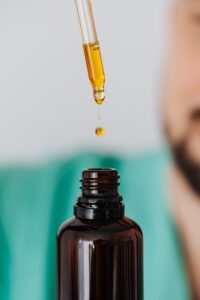 If you suffer from obstructive sleep apnea (OSA), getting a good night’s rest can be difficult. Frequent breathing disruptions deplete your body of oxygen and interrupt your sleep cycle. Although the initial symptoms of OSA may not seem too alarming, you can face potentially life-threatening complications with no treatment. A CPAP or an oral appliance can treat sleep apnea, but is there more you could do to control your symptoms? Yes. Research has found that CBD oil can lead to a better night’s rest.
If you suffer from obstructive sleep apnea (OSA), getting a good night’s rest can be difficult. Frequent breathing disruptions deplete your body of oxygen and interrupt your sleep cycle. Although the initial symptoms of OSA may not seem too alarming, you can face potentially life-threatening complications with no treatment. A CPAP or an oral appliance can treat sleep apnea, but is there more you could do to control your symptoms? Yes. Research has found that CBD oil can lead to a better night’s rest.
What is Obstructive Sleep Apnea?
Obstructive sleep apnea is the most common form of the breathing disorder. Your tongue or the soft tissues in the back of your mouth can collapse to block your airway, which can cause you to stop breathing frequently throughout the night. Your brain will jolt you away to resume normal breathing.
Fatigue, morning headaches, and irritability are only a few complications caused by OSA. With no treatment, you’ll have an increased risk of heart disease, sleep deprivation, depression, and diabetes.
How Can CBD Help Sleep Apnea?
Cannabidiol (CBD) is a compound derived from the cannabis sativa plant, more commonly known as marijuana. However, it isn’t psychoactive because it doesn’t contain the THC compound. CBD is available OTC in many forms, including oils, gummies, and candy.
CBD is a natural remedy to treat many issues, like pain, anxiety, and depression. Recent studies have found that CBD can help patients with insomnia, which is a common symptom of sleep apnea. Although more studies are needed, CBD may help reduce the amount of time it takes to fall asleep.
Managing Obstructive Sleep Apnea
It’s important to speak with your sleep specialist before using any home remedies to manage OSA, including CBD oil. It isn’t a substitute for traditional treatment, like a CPAP. A CPAP is a machine that delivers pressurized air through a mask worn over your mouth or nose to stop breathing disruptions.
As an alternative to a CPAP, patients with mild-to-moderate OSA can benefit from an oral appliance. The custom-fit device moves your tongue and lower jaw into a more comfortable position to prevent them from blocking your airway. It’s a comfortable option that can be used alone or along with a CPAP.
CBD appears to offer promising results for sleep apnea patients, but further research is needed. Continue to follow your sleep apnea treatment plan and discuss any alternative therapies with your sleep specialist.
About Dr. Glenn Thompson
Dr. Thompson earned his dental degree from the Tufts University School of Dental Medicine and has continued his education in the treatment of obstructive sleep apnea. He specializes in oral appliance therapy and strives to help each patient sleep soundly. Request an appointment through his website or call (702) 903-1649.